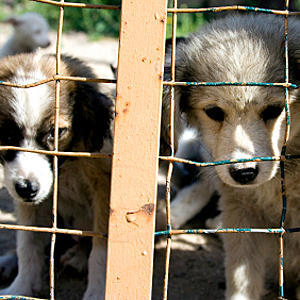Dog Walkin’ Wellington
“Long dogs have more puppies”
Puppy Mills and Backyard Breeders
By Barbara Phillippi
If you are a regular reader of this column, you are aware of my disgust and anger at the selling of “puppy mill” dogs, especially at pet shops. You’ve seen the guys, twirling signs at the curb, advertising “PUPPIES” at a nearby store, because people are charmed by baby dogs, and pay way too much for often defective animals.
“But we can’t find little dogs at the local shelters,” I hear, all the time. The photo that appears below is of “Mickey,” an amazing little dog whose time was up at a nearby kill shelter. I was informed by a rescue group that he needed to be “pulled” immediately, or he would be euthanized.

Mickey is now on his way to a new home in Sarasota. And behind the scenes, good people are still “pulling” doomed animals from shelters, praying that someone will take the time to go online and find an animal rescue site near them.
I’ve been researching Puppy Mill information for this month’s column, but the sheer volume of information and statistics available is staggering. So, I went back to “Dogster,” an online e-magazine, for an article that gets it right, in just a few paragraphs. I urge all readers and dog lovers to get involved in halting the ghastly practice of procreation for bucks.
This article includes information quoted from the article on “Puppy Mills and Backyard Breeders”, found at Dogster.com (http://www.dogster.com/dog-breeds/puppy-mills-and-backyard-breeders), and adds my Commentary to that article.
Bold type inserted into the text below are my comments.
From the “Dogster” Article:
“Part of being a responsible dog owner is being a responsible dog buyer or adopter. If you decide to purchase a pooch, it should be from a reputable breeder – not a backyard breeder or puppy mill. Reputable breeders produce a few, stable and healthy dogs. Puppy mills breed too many dogs with little concern for their health or the conditions they live in.
The History of Puppy Mills
How did puppy mills get started? They’re fairly recent – after WW II, crops were failing and farmers needed to supplement their income. Some started raising and selling puppies, even though they had little knowledge of correct dog care. Puppies were raised as cheaply as possible, often without attention or care. There are now thousands of puppy mills in the U.S.
Who Runs Puppy Mills?
The federal government considers the dogs livestock so anyone can start a mill. But perhaps the best-known group is the Amish in Pennsylvania. Amish puppy mills have been in the news again and again. The Amish defend their practice, claiming dogs are no different than other livestock and that the conditions are not deplorable like some say.
NOTE: Prior to moving to Florida, I lived among the Amish in rural New York State. They are prolific breeders of sub standard dogs of every breed. Because they do not have personal phones or internet connections, they ask neighbors, sometimes for a bit of remuneration, to answer calls from newspaper ads. Sometimes, they pay for land line phones to be connected in a neighbor’s barn, in the neighbor’s name. They have phone cards. I once asked an Amish seller why his Jack Russell Terriers seemed much too “long” for breed standards. The answer? “Long dogs have more puppies.” Really!
Regulation Of Puppy Mills
People breeding large quantities of dogs and selling them are required to have a license by the USDA. The Animal Welfare Act also requires they be regulated. Unfortunately, the regulations are for minimum standards, more for survival than humaneness. Puppy millers aren’t incentivized to follow them. And, of course, there are many puppy mills without licenses. Many people are trying to change this. The Animal Legal Defense Fund is one agency working for reform.
Definition Of A Puppy Mill
Puppy mills are high-volume commercial breeders that sell dogs for profit without providing public access to the breeding site, and breed female dogs every time they come into heat. Conditions usually do not meet our society’s idea of taking care of pets.
Issues Related To Puppies From Mills
- Health: Puppy mills are often dirty and unsanitary. You often see dogs in cages with their own filth, left out in the heat and cold, mal-nourished and with skin problems.
- Behavioral: Puppies are not hand-held from birth like most reputable breeders’ are. This means they have little or no human interaction until they’re sold. This can lead to aggression, anxiety, fear, indifference and a whole host of behavioral problems. Also, living in a small cage crates a poorly adjusted dog.
Inside A Puppy Mill
Newsweek did an even-handed review of puppy mills in 2007. Please GOOGLE the results.
The HSUS also did a hidden-camera investigation of puppy mills.
- Cages: Dogs are usually caged their entire breeding life.
- Breeding: Dogs are often bred every six months, with never a break. After their fertility ends, they are often sold or, sometimes, killed.
- Noise: The noise can be deafening with so many dogs in small spaces.
- Poor Care: Dogs with long hair are often matted. Injuries go unnoticed and/or untreated.
- The Elements: Dogs and puppies are often left out in ice storms and 90 degree weather. Some even don’t have roofs over their heads.
They are often fed and watered every other day, sometimes less. - Getting to a New Home: Puppies are often packed into crates in cargo trucks for transport to a broker or pet store. Often, some die in transport.
Puppy Mill Statistics
- Around 3,500 of the 11,500 pet stores in the U.S. sell cats and dogs, according to the Pet Industry Advisory Council.
- Puppy mills produce about 400,000 litters a year. Dogs are often sold online and to pet shops. They are usually below par in breed standard, and the physical defects are easily spotted by those familiar with the breed. If they’re offered with “papers,“ AKC registrations are often fraudulent.
- Approximately 500,000 puppies are sold at pet stores each year. (HSUS)
If your dog came from a pet store, it was bred at a puppy mill. Your pet is not responsible for its beginnings. But if folks stopped paying for these animals, the market would dry up. - There are more than 6,000 licensed commercial kennels in the U.S. (and untold numbers of unlicensed).
- In the U.S., there are more than 1,000 research facilities, more than 2,800 exhibitors, and 4,500 dealers that are supposed to be inspected each year.
Puppy Mill Facts
Puppy millers will usually not let buyers see their kennels.
Puppy millers are not willing to discuss possible health or behavior issues of their pups.
Puppy millers almost always have puppies for sale. If you visit a breeder’s website with price tags next to the puppy photos or a “buy it now” button, you are most likely on a miller’s webpage.
There is documentation of overbreeding, inbreeding, minimal or no veterinary care, poor quality of food and shelter, lack of human socialization, overcrowded cages and the killing of unwanted animals in puppy mills.
WHAT CAN YOU DO?
There are things you can do to help stop puppy mills. First, don’t buy a puppy from a pet shop. If you answer an online or newspaper ad, make certain you’re dealing with a reputable breeder. The AKC site has a list of breeders by Breed Club and offers information on finding a reputable breeder. You can also check out www.stoppuppymills.org and www.hsus.org, which have information such as how to lobby for better laws.”
Comments on this original article below are not mine, but from Other Dog Owners:
A Word on Small Family Breeders
“Contrary to some here there are those small family breeders who breed one or two litters a year because they want to offer a loving pet or companion. They are not disreputable but may be limited in how they advertise. With the internet often cheaper than many newspapers for placing ads the internet has become the source of the family-run breeder’s advertisements.
The thing that needs to be done is ask for pictures and study them carefully.”
MY opinion: you must visit the family breeder’s facility. No excuses. Reputable ones encourage this. Ask to see the parents. “Look at the puppy: does he look clean and healthy? Are his eyes bright and shiny? If you can answer yes then you are likely dealing with a family breeder who cares for the dogs as if they were fully part of the family. Family breeders are often a good choice for a puppy because they spend the time and energy to socialize the puppy and play with it getting it used to being handled. I would never again buy a dog from a large breeder as I have found the dogs to be anti-social and very skittish.” A small breeder does not indicate the quality of puppies.
~Angi A., owner of a Mini Dachshund
Give Dog Rescues a Chance
“I made the mistake years ago buying a dog at a store before the puppy mill thing came to my attention. I would never buy there again. My dog, who I had to put down, had so many health problems. I spent well over $10,000 for her treatments. I believe it’s because of poor breeding practices. She had a bad spine. Undoubtedly she was the best dog I ever ever had and I’m glad I was able to care for her and give her the life she deserved. There are so many unwanted animals out there that it seems ridiculous to even think of buying from breeders. I’m sure a lot of them love their animals but it does come down to the dollar. To make money. Why not rescue? Seems like better solution to all this. Just my opinion.”
~Lance N., owner of a Redbone Coonhound
My Puppy Mill Story
“Here’s my experience from over 35 years ago: My husband got a puppy from a pet shop for my birthday. We took it to the vet since it was running into things. The pup was apparently born with cataract issues. We returned it to the pet shop and was given another puppy, which died in two weeks from Pneumonia. This was Petland Pet Shop in Florida.
I always tell friends about this so they do not make the mistake we did. Please pass this along to others. These places should not be allowed to sell them. They should be banned, as well as those puppy or kitten mills.”
~Christa , owner of animal shelter cats
“In a perfect world, every dog would have a home, and every home would have a dog.”

***
Over a lifetime, Barbara Phillippi has had mostly “normal” dogs – a few German Shepherds and a bunch of wonderful “mutts,” each with its own wonderful, quirky, qualities. For many years, she taught 4-H dog obedience courses, under the authorization of Cornell University’s Cooperative Extension Services. That terrific program teaches the basics of dog behavior, of every breed, to young dog owners. Today she lives in Wellington with three Jack Russell Terriers – Woody, Gracie, and Buck. “These guys showed me a learning curve that I never knew existed!”

